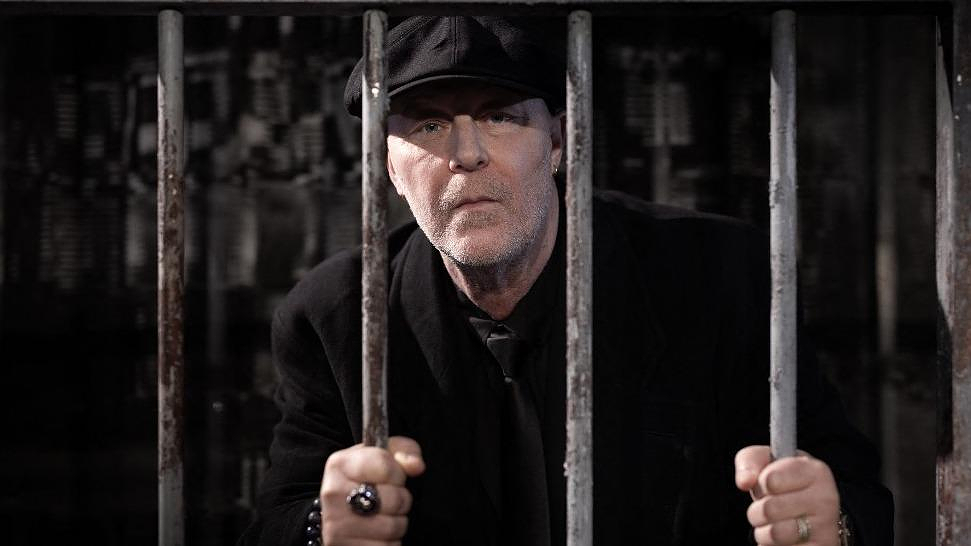“You’ll see, he’s a character,” immediately warns a member of the Frank Henry show team, Thursday January 25, as he pushes open the door to the artists’ entrance. At the end of a corridor, the New Eve room. White tablecloths and small lamps with gathered lampshades adorn tables designed for the moments of complicity offered by the darkness of a theater room. There is an atmosphere reminiscent of the finest hours of this historic Pigalle cabaret: glittery curtains, stars painted on the walls, red carpet and gilding, you almost think you're back at the beginning of the last century.
Almost. Because on stage, the contrast is striking. A sober setting, a coat rack and a black armchair, a backdrop where the blurred outline of a city stretches, and two prison doors. “We are going to start filming,” warns Jérémie Lippmann, the director, on the eve of the premiere. Standing on the plateau is a tall figure in a long black coat. “Can I have five minutes to concentrate?”, replies Frank Henry, who impresses as much by his tone as by his stature.
The lights go out and a phrase rings out in the darkness: “As far as I can remember, I’ve always wanted to be a gangster”, immediately accompanied by the catchy melody of the theme song of Goodfellas by Scorcese. The tone is set. It will be a show, a story worthy of the best Hollywood scripts, a kind of exotic journey at the crossroads between France and America. Except that Frank Henry will not once advocate organized crime. The play Neither Proud nor Shameful meets a clear objective: “Deglamorize, demystify and break the romanticism of gangster life,” says the main person involved. It must be said that the trajectory of this 63-year-old former thug astounds as much as it inspires.
Robberies of banks, jewelry stores, casinos... the most villainous schemes held no secrets for the man nicknamed “The Gunsmith” because of his passion and practice with firearms. He spent 21 years behind bars for his crimes. But Frank Henry quickly clarifies: no blood crime. For an hour and a quarter, the former gangster captivates the spectators and tells how he evolved, from adolescence, in a dark world full of violence. The powerful soundtrack resonates with the backfire of stray bullets, the clicking of safes, the melody of crumpled bills, the urgency of screeching tires.
Frank Henry does not indulge in miserabilism or misplaced pride. Sometimes bitter or angry, he still manages to make his audience smile with lots of anecdotes, each more astonishing than the last. A first botched heist, a return trip to New York by Concorde to visit the mafia, an elegant “heist” at a major jeweler... This story, sometimes chilling, ultimately takes a brighter trajectory and reveals the difficulty in leaving an environment that crushes everything in its path.
Incarcerated several times, he finally had a breakthrough when his son was born and decided to take control of his life. Sent to prison again, he put his time to good use, took musicology exams, wrote four novels and even met Yves Rénier (for a long time in the role of Commissioner Moulin on TV) who would then open the doors of cinema to him. Today, Frank Henry is a writer, screenwriter, lyricist, musician and the greatest directors work with him to benefit from his knowledge of a very codified environment. Did the wolf who became a lamb keep in touch with his comrades in misfortune? “Yes, of course, some are friends. There was even one who snuck into the room during the filming earlier. But I don’t want to know what they’re doing.” He prefers to indulge in his passions, writing, music and now theater.
This is the first time that Frank Henry, a former defendant, has taken to the stage - an extremely rare case in France. The person who describes himself as “a storyteller, a storyteller” would like spectators to leave the theater saying to themselves: “This is not a film, there is nothing glamorous about the life of a gangster. Banditry is initially madness, a serious psychological imbalance,” he says. And the first actor deplores the resurgence of delinquency in France in recent months: “I am not a criminologist or sociologist, but how do you explain that there have recently been more than a hundred deaths in the neighborhoods of Marseille, other than by a society that is going south? Because banditry and delinquency follow the direction given by society and we are in an ultra-violent society. He also warns of the vicious circle that leads young people into a destructive spiral: “Delinquency is a progression, we don’t realize it but we always set the bar a little higher.”
Frank Henry has truly turned the page on his life as a gangster. The repentant bandit, disgusted by the violence of a society that he "can no longer grasp", confides that he only comes out of his "misanthropic shell" to "listen to and work with talented people", because "nothing (makes) him more admiring.” It was therefore natural that he turned to Jérémie Lippman to direct his show. “We got along like thieves! He’s quite rock’n’roll, like me. With him, I transformed into a good little soldier, which doesn’t happen to me often!”, smiles Frank Henry.
And if we had to do it again ? Would he give in to the call of banditry again? "No way !" exclaims Frank Henry.
Although he wishes to change the chaotic start of his life, he nevertheless feels no sense of shame, as the title of the piece indicates. When asked about it, he replies: “Ashamed of what? I was a thief in hard crime but I have no blood on my hands and above all I have paid my debt to society, I owe nothing. I am proud of my career because for twenty years I have had a great career and above all, today, my pride is my child. His mother died when he was a teenager. I think I managed to make a good person out of him, and that’s the most important thing for me,” he finishes, smiling.
Neither proud nor ashamed by Frank Henry, directed by Jérémie Lippmann, plays from January 26 to March 30 at the Théâtre de la Nouvelle Eve in Paris (9th).

 An American tourist steals a mug of beer from a tavern in Munich and admits it...50 years later
An American tourist steals a mug of beer from a tavern in Munich and admits it...50 years later Madagascar calls for replacement of EU ambassador
Madagascar calls for replacement of EU ambassador Chinese journalist released from prison four years after denouncing China's handling of Covid
Chinese journalist released from prison four years after denouncing China's handling of Covid “Russian law” adopted in Georgia: Europeans alongside the streets
“Russian law” adopted in Georgia: Europeans alongside the streets Suicide attempts and self-harm on the rise among young girls
Suicide attempts and self-harm on the rise among young girls In Europe, 10,000 people die every day from cardiovascular disease
In Europe, 10,000 people die every day from cardiovascular disease Brussels raises Spanish GDP forecasts to 2.1% and foresees a deficit of 3% in 2024
Brussels raises Spanish GDP forecasts to 2.1% and foresees a deficit of 3% in 2024 Inflation rises to 3.3% in April due to gas and food
Inflation rises to 3.3% in April due to gas and food Parisian owners of electric SUVs will have to pay a residential parking rate from October 1
Parisian owners of electric SUVs will have to pay a residential parking rate from October 1 Saint-Denis-Pleyel station, “a little Châtelet north of Paris”, ready to open before the Olympic Games
Saint-Denis-Pleyel station, “a little Châtelet north of Paris”, ready to open before the Olympic Games Comedian Guillaume Meurice, still “banned from the air”, awaits his possible sanction
Comedian Guillaume Meurice, still “banned from the air”, awaits his possible sanction GTA 6: the event video game will be released in fall 2025
GTA 6: the event video game will be released in fall 2025 The Le Bon Air festival deprograms the DJ I Hate Models for a private jet story
The Le Bon Air festival deprograms the DJ I Hate Models for a private jet story A golden reward for Yasmina Reza
A golden reward for Yasmina Reza Cannes: a demonstration of the precarious of cinema above the red carpet
Cannes: a demonstration of the precarious of cinema above the red carpet Magician David Copperfield accused of sexual violence by sixteen women
Magician David Copperfield accused of sexual violence by sixteen women Omoda 7, another Chinese car that could be manufactured in Spain
Omoda 7, another Chinese car that could be manufactured in Spain BYD chooses CA Auto Bank as financial partner in Spain
BYD chooses CA Auto Bank as financial partner in Spain Tesla and Baidu sign key agreement to boost development of autonomous driving
Tesla and Baidu sign key agreement to boost development of autonomous driving Skoda Kodiaq 2024: a 'beast' plug-in hybrid SUV
Skoda Kodiaq 2024: a 'beast' plug-in hybrid SUV The home mortgage firm rises 3.8% in February and the average interest moderates to 3.33%
The home mortgage firm rises 3.8% in February and the average interest moderates to 3.33% This is how housing prices have changed in Spain in the last decade
This is how housing prices have changed in Spain in the last decade The home mortgage firm drops 10% in January and interest soars to 3.46%
The home mortgage firm drops 10% in January and interest soars to 3.46% The jewel of the Rocío de Nagüeles urbanization: a dream villa in Marbella
The jewel of the Rocío de Nagüeles urbanization: a dream villa in Marbella Europeans: between the RN and the “euro-gagas”, the communist Léon Deffontaines dreams of breaking through to the left
Europeans: between the RN and the “euro-gagas”, the communist Léon Deffontaines dreams of breaking through to the left Europeans: professor threatened with death Didier Lemaire shows his support for François-Xavier Bellamy
Europeans: professor threatened with death Didier Lemaire shows his support for François-Xavier Bellamy LFI: Manon Aubry places social issues at the center of her European campaign
LFI: Manon Aubry places social issues at the center of her European campaign Diving into the secrets of the National Assembly
Diving into the secrets of the National Assembly These French cities that will boycott the World Cup in Qatar
These French cities that will boycott the World Cup in Qatar Athletics: Mélina Robert-Michon improves her best mark of the season at the Montreuil meeting
Athletics: Mélina Robert-Michon improves her best mark of the season at the Montreuil meeting Calendar, Mbappé in Madrid, Milanese in Australia: what awaits the Blues between now and the Euro
Calendar, Mbappé in Madrid, Milanese in Australia: what awaits the Blues between now and the Euro French team: Warren Zaire-Emery forced to postpone his baccalaureate... to participate in the Euro
French team: Warren Zaire-Emery forced to postpone his baccalaureate... to participate in the Euro French team: “The situation in my head was clear”, Deschamps explains Kanté’s return
French team: “The situation in my head was clear”, Deschamps explains Kanté’s return


















